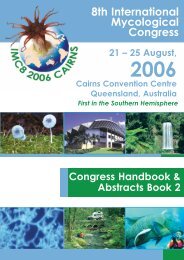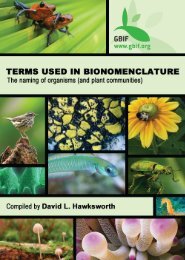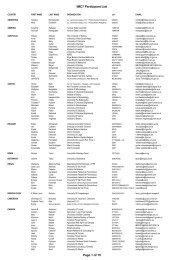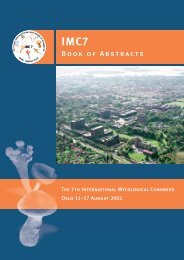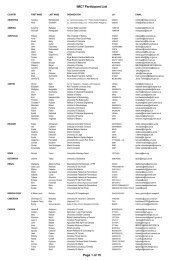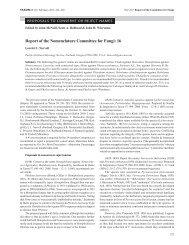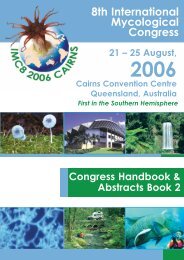l - F. Oberwinkler - International Mycological Association
l - F. Oberwinkler - International Mycological Association
l - F. Oberwinkler - International Mycological Association
You also want an ePaper? Increase the reach of your titles
YUMPU automatically turns print PDFs into web optimized ePapers that Google loves.
Institut für Evolution<br />
und Ökologie<br />
Organismische Botanik<br />
Organismische Botanik · Auf der Morgenstelle 1 · D-72076 Tübingen<br />
Professor Dr. Pedro Crous<br />
Fungal Biodiversity Centre<br />
P.O.Box 85167<br />
3508 AD Utrecht<br />
The Netherlands<br />
Dear Pedro,<br />
Lehrstuhl Organismische Botanik<br />
Leitung: PD Dr. Michael Weiß<br />
Auf der Morgenstelle 1<br />
D-72076 Tübingen<br />
Telefon: 0 70 71 · 29 72610<br />
Telefax: 0 70 71 · 29 5344<br />
michael.weiss@uni-tuebingen.de<br />
31 May 2010<br />
Herewith we would like to nominate Professor Dr. Franz <strong>Oberwinkler</strong> for the De Bary<br />
Medal of the <strong>International</strong> <strong>Mycological</strong> <strong>Association</strong> for outstanding career research.<br />
Franz <strong>Oberwinkler</strong> has contributed to science for almost 50 years in various fields of<br />
fungal research. Besides his overwhelming scientific output he is a great teacher and<br />
many of his scholars have become influential mycologists as well. In the following we<br />
want to highlight some of the milestones among his scientific contributions.<br />
First of all, Franz <strong>Oberwinkler</strong> had a major impact on our understanding of the<br />
systematics of basidiomycetes. Inspired by a deep interest in detailed morphology and<br />
anatomy of basidia and basidiocarp ontogeny and their comparative analysis his work<br />
revolutionarized basidiomycete systematics in wide parts. Early work concentrated on<br />
primitive basidiomycetes and their basidial types. Here, his results particularly<br />
emphasized the phylogenetic significance of basidial morphology. Besides on primitive<br />
basidiomycetes he worked on Corticiaceae, basidiolichens, auricularioid and tremelloid<br />
fungi, the relationships between Agaricales and Aphyllophorales and many other topics<br />
of basidiomycete evolution. He studied most of the basidiomycetous genera. A first<br />
overview was already published in 1977 based on an enormous number of personal<br />
observations and studies. The affiliation of gasteromycetous taxa to various<br />
agaricalean, boletalean and other groups is mainly based on his detailed studies in<br />
comparative anatomy. The thorough analysis of ultrastructural characters such as<br />
septal pores, spindle pole bodies and interaction structures was initiated by him and<br />
performed under his supervision for a long time, resulting in a completely new<br />
understanding of the evolution of the basal groups of basidiomycetes. The tripartite<br />
grouping within the Basidiomycota instead of the traditional bipartite grouping in Hetero-<br />
and Homobasidiomycetes was early supported by his work.<br />
Together with his scholars, he covered Basidiomycota as a whole in countless studies.<br />
He investigated not only morphology, but included all relevant characters ranging from<br />
physiology to genetics to understand the main evolutionary trends in basidiomycetes.<br />
Thus, several updates of basidiomycete systematics have been published during his<br />
active period and our modern view on Basidiomycota is highly influenced by his work.<br />
The knowledge of heterobasidiomycetous fungi is linked to his name and numerous<br />
taxa would not have been described without his comprehensive scientific contributions<br />
to mycology.
2<br />
Besides the work on basidiomycete systematics he encouraged various major<br />
mycological endeavours such as the use of secondary metabolites for systematics, the<br />
role of yeasts in biodegradation, the use of molecular data for fungal phylogenetics, the<br />
study of the biology of mycorrhiza, the coevolution of plant parasites with their hosts and<br />
many more. He has always been very engaged in education. During his whole career<br />
he attracted excellent students and motivated them to broaden their horizon and to push<br />
the limits of knowledge in mycological research further from year to year. Numerous<br />
students passed PhD under his supervision; many of his scholars are highly influential<br />
in mycology today.<br />
In addition to his scientific excellence he had an enormous political impact on mycology<br />
– not only in Germany but worldwide. He initiated mycological research projects at<br />
various levels. He is still representing botany and mycology in the German Science<br />
Foundation (DFG) and trying to push mycology wherever it is possible. He has been<br />
working for the international mycological community for a long time. He was participant<br />
on all <strong>International</strong> <strong>Mycological</strong> Congresses. He was president of the IMA from 1994-<br />
1998 and holds memberships of many mycological societies worldwide.<br />
Consequently, Franz <strong>Oberwinkler</strong> is outstanding in basidiomycete systematics, and<br />
there is no doubt that he had a great influence on the development of fungal<br />
systematics during the last 50 years. In total he published more than 300 articles in<br />
journals most of which are internationally well known and highly acknowledged in the<br />
field of mycology. Therefore, we would like to nominate Professor Franz <strong>Oberwinkler</strong> for<br />
the De Bary Medal of the <strong>International</strong> <strong>Mycological</strong> <strong>Association</strong> in 2010.<br />
We would be very glad if the <strong>International</strong> <strong>Mycological</strong> <strong>Association</strong> would consider our<br />
nomination.<br />
Sincerely,<br />
PD Dr. Michael Weiß PD Dr. Robert Bauer



